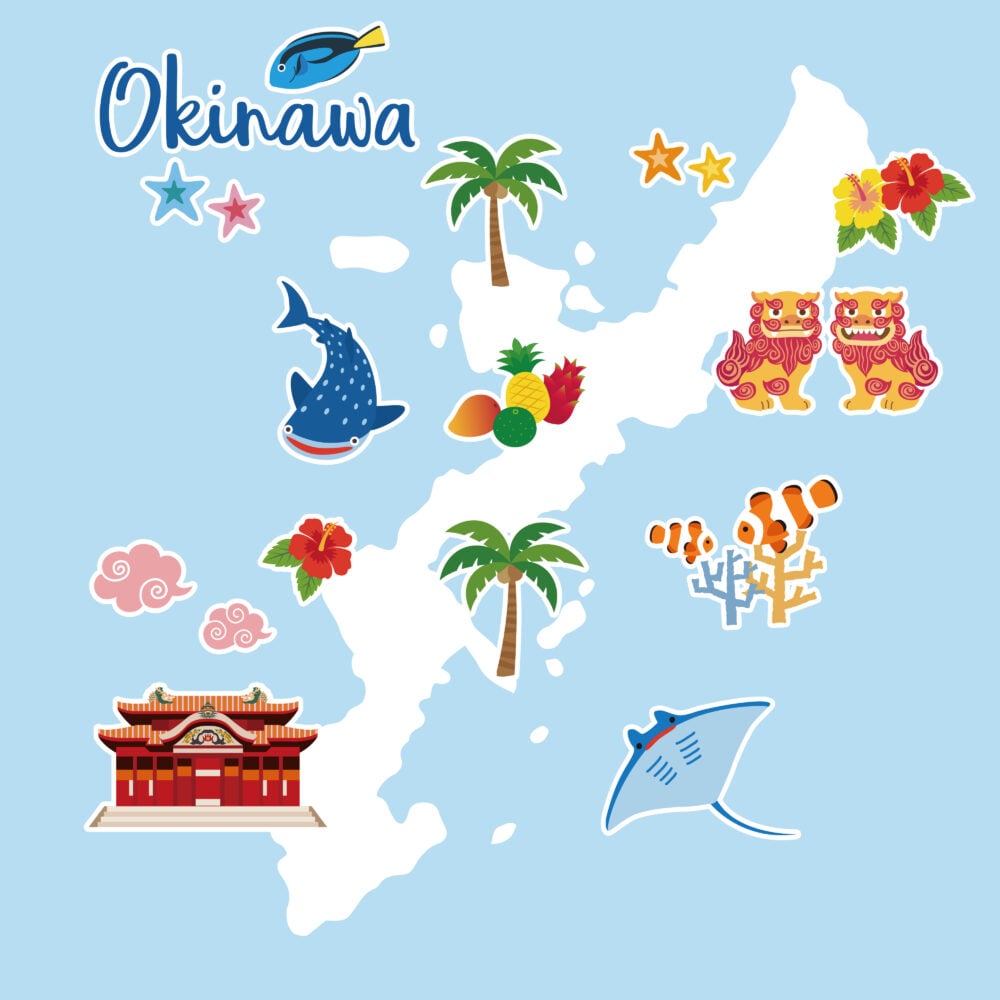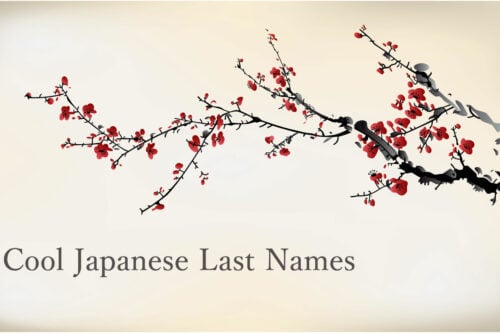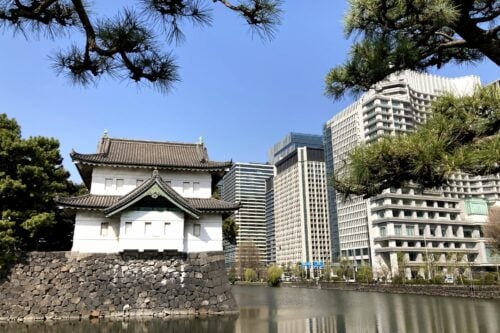Share on your favorite
Or copy the link
Below are navigation links that will take you to the main text and navigation menus.
26,551 first names, 70,620 last names, 333,585 kanji variations.
one of the best Japanese name search tools for your baby!

Okinawa travel map with local specialties (Shisa; tropical fruits; whale shark; hibiscus; palm tree; coral; tropical fish; starfish; strong Okinawan liquor; manta ray)
Have you been to Okinawa?
Okinawa is the most western part of Japan and has a population of 1.45 million. It is composed of 37 inhabited remote islands with magnificent nature. Many people from the Japanese mainland migrate to Okinawa for the amazing nature.
Also, it is a very popular holiday destination for Japanese people, as well as for weddings and honeymoons.
Contents

In Japan, people can tell whether a person is from Okinawa just by hearing his/ her family name. To those who have distinctive surnames, if we ask, “Are you from Okinawa?” we’ll usually get the right answer. This is because Okinawa people’s family name is very different from people from Japan’s mainland.
Okinawa was once an independent country under the control of the “Ryukyu Kingdom”. At that time, it was not in the form of a family name and a given name during the former “Ryukyu Kingdom”. However, when an invasion by the people of the Satsuma clan began in 1609, the Okinawans were ordered to adopt a Japanese family name.

Naha, Okinawa, Japan at historic Shuri Castle during twilight.
Reference: 名字由来net
More than 95% of the “Higa” surname in Japan live in Okinawa Prefecture.
The word “Higa” is based on the word “east”. The reason why it is the most common family name in Okinawa is that in Okinawa it was believed that God’s kingdom was located in the direction of the east, where the sun rises. And the direction of the east was sacred. Because of this, it is used as a family name in many places in Okinawa.
Nowadays, 金城(Kinjo) is commonly read as “Kinjō”, but it was originally “Kane-gusuku”. In Okinawa, there are many castles called ”Tama-gusuku”, “Naka-gusuku” and “Tomi-gusuku”.
“Gusuku” means castle (城), “金” means gold. As a family name, “金城” represents something precious and valuable.
”大” means big, so “大城” means “Big castle”.
Some of the common surnames in Okinawa, such as “金城 (Kinjo)”, “大城(Oshiro)”, “玉城 (Tamashiro)” and “山城(Yamashiro)”, contains the word “城” – meaning is a castle. The reason for this is that it said during the Ryukyu period, there were many castle ruins in various places. Those became the names of places, and it is said that many people have taken their surname from the name of the place.
The name comes from the name of a place that existed during the ”Ryukyu Kingdom”. The name used to read “Nā-gusuku”. “宮” is referred to a large house inhabited by a person of high status.
It has its origins in a specific place, Arakaki Village, that existed during the ”Ryukyu Kingdom”. The “新” means new, “垣” means fence.
The name came from the name of a place in the “Ryukyu Kingdom”. It was once called “Tama-gusuku”. In Okinawa, it is often called “Tamashiro”, but it is also sometimes called “Tamaki” in Japan mainland. “玉” means a beautiful and treasured piece of stone.
“上原” means a field in the higher part of the village. It is said that the name comes from the area named “Uehara” in Uruma city during the ”Ryukyu Kingdom”. The name was originally called “Ī-baru”.
The only known origin of “島袋” is that it came from the name of a place during the Ryukyu period. In the Ryukyu period, it was called “Shimabuku”, but nowadays “Shimabukuro” is commonly used. “島” means island, 袋 means bag.
The name is said its origin is the name of a place in the Ryukyu period. It was originally called “Tēra”.
The name is said to be a character from the dialect “Pisa-ra” of the locals who lived in this region. “Pisa” means flat and “Ra” means land. However, there is no proof of this tradition. It is also said it was originated with the 12th century Taira clan – samurai clan – but this is also not known for certain.
”山城” is said to have originated from the name of a place named ”Yamashiro” in Uruma City, Okinawa Prefecture. It was once called ”Yama-gusuku. “山” means mountain.

There are nearly 300,000 different surnames in Japan, but there are only about 1,500 different surnames in Okinawa. If you met a person with the last name with these characteristics, you can ask them “Are you from Okinawa?” Even if the person is not from Okinawa themselves, he or she is likely to have Okinawa roots in their ancestry. You may have a lot of fun talking about Okinawa.
If you already have traveled to Japan’s mainland, you may feel Okinawa is a completely different country. I think one of the reasons for this is their name. Why don’t you go and discover the unusual names of the Okinawan people and enjoy the magnificent sea of Okinawa?



Sort by: Most Relevant
Sorts names by how closely they match your search meaning. Names containing more kanji that match your search terms appear higher in the results.
Sort by: Most Kanji Variations
Sorts names by how many different kanji spellings they have. In general, names with more variants tend to be more familiar and widespread in Japan (with some exceptions).
Sort by: Most Viewed
Sorts names by page views on this site. Views reflect global traffic (including Japan), so this does not represent popularity among Japanese people only. A high view count does not necessarily mean the name is famous in Japan.
What is Hiragana?
Hiragana is one of the two Japanese syllabaries. Each character represents a sound (mora), not a meaning. It is used for native words, grammatical particles, verb/adjective endings (okurigana), and to show pronunciation above kanji (furigana). It developed from cursive forms of kanji.
What is Katakana?
Katakana is one of the two Japanese syllabaries. Each character represents a sound (mora), not a meaning. It is mainly used to write foreign words and names, loanwords, onomatopoeia, and for emphasis.
What is a Kanji Idea?
Kanji are Chinese characters used in Japanese writing. Unlike katakana and hiragana, each kanji character carries its own meaning.
When we convert your name into kanji, we select characters whose sounds match the Japanese pronunciation of your name, while also considering the meaning of each character. The result is a unique combination of kanji that both sounds like your name and carries meaningful symbolism.
We refresh the kanji combination each time you visit, so you can discover different options. If you find one you like, save it to your favorites!
What are English Syllables?
A syllable is a unit of pronunciation in English — it’s the beat you hear when you say a word.
Here are a few quick examples:
cat = 1 syllable
ba-by = 2 syllables
beau-ti-ful = 3 syllables
On this site, English Syllables show how a name naturally breaks into sounds when spoken in English. This helps you understand how English speakers naturally say the name and where they pause between sounds.
What are Japanese Morae?
A mora (plural: morae, Japanese: 拍 Haku) is the basic unit of sound in Japanese — think of it as one rhythmic “beat” when speaking.
Here are a few quick examples:
あ (a) = 1 mora
あい (a-i) = 2 morae
きょう (kyo-u) = 2 morae
On this site, Japanese Morae show how many “beats” a name has in Japanese. Most Japanese names have about 2–4 morae, which affects how natural and rhythmic the name sounds to native speakers.
This helps you see how the name fits into the natural rhythm of Japanese speech.
What is English Transcription?
“English transcription” (romanization) is the romanized form of a Japanese name, intended to reproduce its pronunciation as closely as possible. It is also useful for searching names on this site.
Japanese-Style Nicknames
In Japan, nicknames are used to express familiarity and affection. Typical features include:
Shortened forms: Names are often shortened for closeness, e.g., “Yuki” from “Yukiko” or “Taka” from “Takashi”.
Suffixes: Terms like “-chan” (often for girls, also for young children) and “-kun” (often for boys) are used among family and close friends. Among very close adults, “-chan” may still be used. More details
Use & context: Nicknames are informal—common among friends, family, or close colleagues—and are not suitable for formal or professional settings. Their use implies a certain degree of intimacy.
Long vowels: The long vowel mark “chōonpu” (ー) extends the preceding vowel. For example, “あーちゃん” (A-chan) lengthens the “あ” sound.
Households
Sorts surnames by the estimated number of Japanese households that use them. More households generally indicates a more common or well-known surname.
About our last-name data

Success
Migration completed successfully!